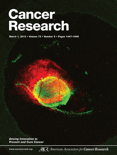
CANCER RESEARCH
Scope & Guideline
Fueling the fight against cancer through rigorous research.
Introduction
Aims and Scopes
- Cancer Biology and Mechanisms:
Research exploring the molecular and cellular mechanisms underlying cancer initiation, progression, and metastasis, including studies on genetic mutations, epigenetic alterations, and the tumor microenvironment. - Therapeutic Strategies and Drug Development:
Investigations into novel therapeutic approaches, including targeted therapies, immunotherapies, and combination treatments, aimed at improving clinical outcomes for cancer patients. - Biomarkers and Prognostic Indicators:
Studies focused on identifying and validating biomarkers that can predict cancer progression, treatment response, and patient prognosis, aiding in personalized medicine. - Clinical Trials and Translational Research:
Reports on clinical trials evaluating new treatments, surgical techniques, and interventions, bridging the gap between laboratory research and patient care. - Cancer Epidemiology and Risk Factors:
Research analyzing epidemiological data to identify risk factors associated with various cancer types, contributing to prevention strategies and public health initiatives. - Innovative Methodologies:
Development and application of cutting-edge techniques, such as machine learning, genomic sequencing, and advanced imaging, to enhance cancer research and diagnostics.
Trending and Emerging
- Immunotherapy and Immune Microenvironment:
A significant increase in studies focusing on immunotherapy, including checkpoint inhibitors and CAR T-cell therapy, as researchers explore the immune landscape's role in cancer progression and treatment response. - Targeted Therapy and Precision Medicine:
Emerging research on targeted therapies that exploit specific genetic alterations within tumors, alongside studies on biomarkers for patient stratification and personalized treatment plans. - Role of Non-Coding RNAs:
A growing body of literature investigating the functions of long non-coding RNAs (lncRNAs) and microRNAs in cancer biology, particularly their roles in regulating gene expression, cancer stemness, and treatment resistance. - Metabolic Reprogramming in Cancer:
Research focusing on the metabolic adaptations of cancer cells, including the study of pathways like glycolysis and ferroptosis, as potential targets for therapeutic intervention. - Multi-Omics Approaches:
An increase in studies utilizing multi-omics strategies (genomics, transcriptomics, proteomics) to gain comprehensive insights into cancer biology and identify novel therapeutic targets.
Declining or Waning
- Traditional Chemotherapy Studies:
Research centered on conventional chemotherapy regimens has decreased as newer targeted therapies and immunotherapies gain traction, leading to a shift in focus toward more personalized and effective treatment modalities. - Basic Research on Non-Malignant Conditions:
Investigations into benign tumors and non-cancerous conditions have become less frequent, as the journal prioritizes research that directly impacts cancer treatment and understanding. - Single-Agent Drug Studies:
The prevalence of studies evaluating the efficacy of single-agent drugs has waned, with a growing emphasis on combination therapies and multi-targeted approaches to overcome resistance and enhance treatment outcomes.
Similar Journals
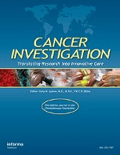
CANCER INVESTIGATION
Exploring the frontiers of cancer research with precision.CANCER INVESTIGATION is a distinguished peer-reviewed journal published by Taylor & Francis Inc, dedicated to the advancing field of cancer research and oncology. With an ISSN of 0735-7907 and E-ISSN of 1532-4192, this journal has been a pivotal resource for professionals and researchers since its inception in 1983, continually contributing to the evolving landscape of cancer investigation until its convergence in 2024. CANCER INVESTIGATION boasts noteworthy rankings in 2023, including Q3 in Cancer Research and Q2 in Medicine (miscellaneous), highlighting its relevance and impact in these critical areas. The journal's commitment to disseminating innovative research and comprehensive reviews makes it an essential platform for those engaged in cancer studies and related disciplines. While currently not available as an open-access publication, CANCER INVESTIGATION remains an invaluable tool for understanding the complexities of cancer, offering insights that drive scientific advancements and improve patient outcomes.

BIOCHIMICA ET BIOPHYSICA ACTA-REVIEWS ON CANCER
Advancing the Frontiers of Cancer ResearchBIOCHIMICA ET BIOPHYSICA ACTA-REVIEWS ON CANCER, published by Elsevier, has established itself as a leading journal in the domains of cancer research, genetics, and oncology, holding a prestigious position in the Q1 quartile rankings in these fields as of 2023. With an ISSN of 0304-419X and an E-ISSN of 1879-2561, this journal aims to disseminate high-quality, impactful reviews that synthesize the latest advancements and findings in cancer biology, treatment modalities, and genomic studies. Its robust indexing and remarkable Scopus rankings—placing it in the 95th to 91st percentiles across various categories—underline its significance for researchers, clinicians, and students passionate about oncology. Operating from its Netherlands headquarters, BIOCHIMICA ET BIOPHYSICA ACTA-REVIEWS ON CANCER is dedicated to fostering a comprehensive understanding of the complex biological mechanisms underlying cancer, promoting innovative therapeutic strategies, and guiding future research directions.

Annual Review of Cancer Biology
Bridging Academia and Clinical Applications in Cancer ResearchAnnual Review of Cancer Biology is a pivotal journal published by Annual Reviews, specializing in the rapidly evolving field of cancer research. With an impact factor positioned in the distinguished Q1 quartile of Cancer Research, Cell Biology, and Oncology categories, this journal ensures that it showcases the highest quality of scholarly contributions. Indexed in Scopus, it ranks among the top in its fields, reflecting its strong influence and relevance, with remarkable percentiles indicating its esteemed position within the research community. Although not an open-access journal, it provides a comprehensive platform for advancing the frontiers of cancer biology through rigorously curated reviews, highlighting key developments, breakthroughs, and future directions that inform both academia and clinical applications. As a valuable resource for researchers, professionals, and students, the Annual Review of Cancer Biology serves as an essential guide for understanding and addressing the complexities of cancer biology today.
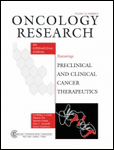
ONCOLOGY RESEARCH
Empowering Researchers to Transform OncologyONCOLOGY RESEARCH, published by TECH SCIENCE PRESS, is a vital academic journal dedicated to the rapidly evolving field of oncology. With its ISSN 0965-0407 and E-ISSN 1555-3906, the journal serves as a key resource for researchers, clinicians, and academicians committed to advancing cancer research and treatment strategies. Operating without an Open Access model, ONCOLOGY RESEARCH provides high-quality, peer-reviewed articles that cover diverse topics within cancer research, medicine, and oncology, with its 2023 Scopus ranking placing it in the Q3 quartile. The journal's commitment to facilitating rigorous scientific discourse is evident in its historical breadth, with a publishing history dating back to 1992. ONCOLOGY RESEARCH is not only significant for the academic community but also plays a critical role in fostering new insights and approaches in the fight against cancer, making it a must-read for those involved in this critical area of study.
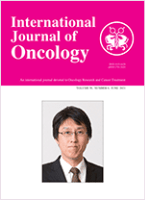
INTERNATIONAL JOURNAL OF ONCOLOGY
Shaping the future of cancer care through knowledge.INTERNATIONAL JOURNAL OF ONCOLOGY is a leading academic publication dedicated to advancing the field of cancer research and treatment. Published by SPANDIDOS PUBL LTD in Greece, this journal, with ISSN 1019-6439 and E-ISSN 1791-2423, has established itself as a reputable source of peer-reviewed articles since its inception in 1993. With an impressive Q2 ranking in both Cancer Research and Oncology categories, as well as high Scopus ranks reflecting its significant contribution to the fields of Medicine and Biochemistry, the journal offers a platform for researchers, clinicians, and students alike to disseminate their findings and engage in dialogue surrounding innovative practices and breakthroughs. Although the journal follows a traditional subscription model, it continues to attract a diverse readership interested in the latest developments in oncological research, providing essential insights into cancer biology, therapeutics, and patient care. With a commitment to excellence, the INTERNATIONAL JOURNAL OF ONCOLOGY plays a vital role in shaping the future of oncology research and is a must-read for anyone passionate about advancing cancer treatment and prevention.

Journal of the Egyptian National Cancer Institute
Fostering collaboration in the fight against cancer.Journal of the Egyptian National Cancer Institute, published by SPRINGER, serves as a vital platform for disseminating innovative research in the field of oncology and cancer research. With both ISSN 1110-0362 and E-ISSN 2589-0409, this Open Access journal has been committed to making significant contributions to the scientific community since its inception in 2005. Operating from its base in Egypt, it has established itself as an important resource for researchers, practitioners, and students alike, offering insights into contemporary issues and advancements in cancer care. Recognized in the 2023 category quartiles as Q3 in Cancer Research and Q3 in Oncology, the journal is positioned to impact the ongoing discourse in cancer treatment strategies and health policy. As it continues to publish peer-reviewed articles through available Open Access avenues, the Journal of the Egyptian National Cancer Institute remains dedicated to enhancing the knowledge base and collaborative efforts within the global cancer research community.

Cancers
Transforming cancer knowledge into impactful solutions.Cancers is a leading peer-reviewed journal published by MDPI, dedicated to advancing the field of oncology and cancer research. Established in 2009 and based in Switzerland, this Open Access journal provides a platform for the rapid dissemination of high-quality research findings, reviews, and clinical studies related to all aspects of cancer biology and treatment. With an impressive impact factor and recognized as Q1 in Oncology and Q2 in Cancer Research for 2023, Cancers strives to foster a collaborative environment among researchers, healthcare professionals, and students seeking to deepen their knowledge and understanding of cancer. The journal’s commitment to accessibility and its broad scope make it an invaluable resource for anyone passionate about combating cancer and improving patient outcomes. For more information and to access its diverse publications, visit the journal’s website.

CLINICAL & EXPERIMENTAL METASTASIS
Advancing Knowledge in Metastatic DiseaseCLINICAL & EXPERIMENTAL METASTASIS is a highly regarded academic journal dedicated to the study of cancer metastasis, published by Springer. With an ISSN of 0262-0898 and an E-ISSN of 1573-7276, this journal serves as a pivotal resource for researchers and professionals dedicated to understanding the complexities of metastatic disease. Based in the Netherlands, it boasts an impressive impact factor, solidifying its position in two major quartiles: Q2 in Cancer Research and Q1 in both Medicine (Miscellaneous) and Oncology for 2023. The journal not only ranks among the top tier in Medicine Oncology—84th out of 404—but also excels in Biochemistry, Genetics and Molecular Biology in Cancer Research, ranking 75th out of 230. With coverage spanning from 1983 to 2024, CLINICAL & EXPERIMENTAL METASTASIS presents cutting-edge research, reviews, and clinical studies that drive the field forward. This journal is essential for anyone looking to deepen their understanding of cancer metastasis and its underlying mechanisms.
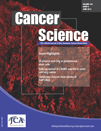
CANCER SCIENCE
Advancing oncology research for a healthier tomorrow.Cancer Science, an esteemed journal published by Wiley, stands at the forefront of oncology research, boasting an impressive impact factor and a classification in the Q1 category for its contributions in Cancer Research, Medicine, and Oncology as of 2023. Since its inception in 2003 and transitioning to an Open Access model in 2014, the journal has facilitated global dissemination of critical research findings, ensuring that vital information remains accessible to researchers, clinicians, and students alike. With its comprehensive scope covering cutting-edge discoveries in cancer biochemistry, genetics, and molecular biology, Cancer Science is recognized for its rigorous peer-review process and significant contributions to advancing our understanding of cancer. The journal, located at 111 River St, Hoboken, NJ, is an essential resource for anyone dedicated to improving treatment outcomes and pushing the boundaries of cancer research.
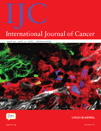
INTERNATIONAL JOURNAL OF CANCER
Exploring the frontiers of cancer science and treatment.INTERNATIONAL JOURNAL OF CANCER, published by Wiley, stands as a premier platform for the dissemination of cutting-edge research in the fields of cancer research and oncology. With an impressive impact factor reflecting its rigorous peer-review process and significant contribution to the scientific community, this journal is categorized in Q1 for both Cancer Research and Oncology as of 2023. It boasts notable rankings, being placed 38th among 404 journals in Medicine - Oncology and 32nd among 230 in Biochemistry, Genetics, and Molecular Biology - Cancer Research, positioning it within the 90th and 86th percentiles, respectively. Since its inception in 1966 and continuing to 2024, the journal has played a pivotal role in advancing our understanding of cancer biology, treatment modalities, and innovative therapeutic approaches. While it operates under a subscription model, the journal is committed to making valuable research accessible to a broader scientific audience. Researchers, professionals, and students alike will find the INTERNATIONAL JOURNAL OF CANCER an essential resource for staying abreast of the latest advancements in cancer science.